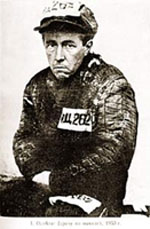Yesterday, an estimated two thousand people filled the National Cathedral in Washington for a memorial service that celebrated the post-incarceration life of Charles W. Colson, the Watergate conspirator-turned-evangelical who died last month. Colson was part of an infamous group of men in the Nixon White House who could be charitably described as revolting. In 1974 he went to prison for Watergate-related crimes including the cover-up that toppled a president. Seven months later, he was “born again,” as he proclaimed upon release—a changed man.
Many were skeptical of his jailhouse conversion, then and for years afterward. But Colson eventually proved them wrong as he dedicated the second half of his life to serving the spiritual needs of his fellow sinners in the slammer, through his organization, Prison Fellowship Ministries.
This basic story line and its variations are not unfamiliar. Many have gained remarkable insights into themselves and their world, peering out from behind bars. Some, like Colson, were incredibly guilty; some were ultimately vindicated; others were prisoners of conscience or of politics. Nelson Mandela, to name a revered one, was a violent revolutionary, overflowing with resentment (and not without cause), when thrown into the cramped prison cell that contained him for 27 years, courtesy of South Africa’s white minority regime. He came out a reconciler. Mandela’s honored guest at his 1994 presidential inauguration was his white jailer.
Some inmates have reached a level of consciousness where they could see themselves as radically free. They might even look upon the rest of us, on the outside, as existing in a kind of spiritual incarceration. Such was the illumination given to Aleksandr Solzhenitsyn during his eight years in the Russian gulags after World War II.
Mistaken as Alive
In his 1973 classic The Gulag Archipelago, Solzhenitsyn recalled when he and his fellow political captives were transferred from one slave labor camp to another, on a regular passenger train. They were dressed in ordinary clothes because the gulags were a state secret. “You sit on ancient passenger benches, and you hear strange and insignificant conversations,” he wrote of train-station palaver about trivialities such as family members who don’t wipe their feet after they walk through the apartment door. “The only one there who is alive, truly alive, is incorporeal you, and all these others are simply mistaken in thinking themselves alive.”
These quotes come from a handy sourcebook, Foundations of Theological Study, edited by Richard Viladesau and Mark Massa, S.J. Solzhenitsyn continues:
So what’s this about unwiped feet? And what’s this about a mother-in-law? What about the main thing in life, all its riddles? If you want, I’ll spell it out for you right now. Do not pursue what is illusory—property and position: all that is gained at the expense of your nerves decade after decade, and is confiscated in one fell night. Live with a steady superiority over life—don’t be afraid of misfortune; and do not yearn after happiness; it is, after all, all the same: the bitter doesn’t last forever, and the sweet never fills the cup to overflowing. It is enough if you don’t freeze in the cold and if thirst and hunger don’t claw at your insides. If your back isn’t broken, if your feet can walk, if both arms can bend, if both eyes see, and if both ears hear, then whom should you envy? And why? Our envy of others devours us most of all. Rub your eyes and purify your heart—and prize above all else in the world those who love you and who wish you well.
Viladesau and Massa note in their introduction to the excerpt from The Gulag Archipelago that Solzhenitsyn’s train-station experience amounted to a spiritual awakening. Though his circumstances were extraordinary, he seemed to speak for Mandela, Colson, and many others unknown when he wrote: “I turn back to the years of my imprisonment and say, sometimes to the astonishment of those about me: Bless you, prison!”







My father, who was briefly a political prisoner as a youth, once told me that prison is a “good school” for a writer.